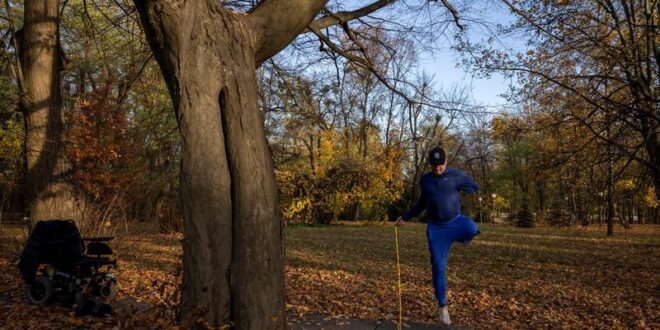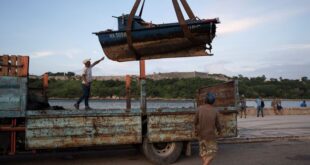NIZHYN, Ukraine (Reuters) – Oleksandr Revtiukh fires a vicious hook at the seasoned fighter facing him. He’s in the boxing ring, eight months after losing his left arm and most of his left leg in mine blasts while fighting in Ukraine.
Revtiukh follows with a snarling jab. His old life is gone. Only two years ago he had enjoyed a comfortable civilian life as an electronics technician abroad, before he returned to Ukraine to sign up and fight the Russian invasion.
A furious uppercut, bellowing with the effort. The war has left trauma. Now he has to accept what has happened to him and learn to live without his lost limbs.
“It’s like being a newborn child,” the 33-year-old says during a break in training at a gym in the Ukrainian capital Kyiv. “You’ve got to get to know the world from scratch.”
Revtiukh, who has a prosthetic leg, is one of tens of thousands of Ukrainian combat amputees who are having to adapt to a new life as civilians or back in the military.
His sister Natasha films the sparring session with leading Ukrainian boxer Aram Faniyan, to upload to her brother’s social media accounts where he’s trying to make his name as a motivational coach for others in his position.
“I can’t be afraid to make mistakes,” Revtiukh told Reuters. “Look for a way out, there is a path through the thorns to the stars. This is my motto.”
Revtiukh, who left a well-paid job in Hungary in April 2022 to return to fight in Ukraine, lost his arm and leg in June last year during the summer’s counteroffensive, and narrowly cheated death. He benefited from the support of his family as he underwent surgery and rehabilitation provided by the state.
As for what comes next he must make his own way, in a country where many amputees say that budget constraints, social taboos and a lack of job opportunities are making that transition more difficult.
Ex-soldier and lawyer Masi Nayyem, co-founder of Pryncyp, a human rights organisation representing soldiers, estimated that between 20,000 and 50,000 soldiers had become amputees in Ukraine since Russia’s full-scale invasion in February 2022.
Official figures are not published and are considered sensitive by the military, but as the war drags into its third year with no end in sight, the numbers will only grow.
SHRAPNEL HITS SPINE
Nayyem said there were too few jobs available for the wounded, and that most initiatives to help them were in cities, leaving maimed soldiers in rural areas and small towns stranded.
“If a person is not integrated, what will they become? They will be depressed, and they will not be able to earn money.”
Ukraine’s Veteran Affairs Ministry, which oversees amputees, declined to give official data on the number of soldiers who had lost limbs. It did not respond to such criticism that it wasn’t doing enough to support amputees once they reentered society after receiving initial hospital rehab with prosthetic limbs.
Rostyslav Prystupa, a former soldier partially paralysed after a piece of shrapnel hit his spine while fighting in Mariupol, said he was mindful that veterans also had to learn to support themselves in civilian life.
“When you keep doing everything for people, they won’t learn to do it themselves,” he added. “You’re not going to do everything for them their whole lives. Someday I’ll have to do it myself, and then I won’t be able to, and no one will be there.”
NO REGRETS: WE SET EXAMPLE
Revtiukh is close to his family, and recently visited his parents’ home in Nizhyn, northeast of Kyiv. Waiting outside, his grandmother wept as she embraced Revtiukh, whom she had not seen since his arm and leg were torn off in two separate mine blasts.
“My little Sasha. I thank God that you are alive,” she sobbed, using the diminutive of his first name.
Revtiukh described how he was wounded when he triggered anti-personnel mines during chaotic fighting to seize back territory from the Russians in the southern Zaporizhzhia region.
He recalled nearly suffocating from the dirt and shrapnel in his mouth after one explosion, but a fellow soldier, a 22-year-old named Gleb who was also wounded, cleared his airways and saved his life.
As Revtiukh begins his journey into civilian life, the boxing enthusiast is, for now, trying his hand at motivational coaching and ultimately he plans to become a history teacher in his native city of Nizhyn in northern Ukraine.
He has no regrets about the path he has taken, saying he and other veterans like him would set an example for the next generation.
“They’ll look to us as a model in the struggle for independence, freedom of speech and the preservation of human lives.”
(Reporting by Thomas Peter; Editing by Mike Collett-White and Pravin Char)
 BeritaKini.biz Berita Viral Terkini di Malaysia
BeritaKini.biz Berita Viral Terkini di Malaysia





